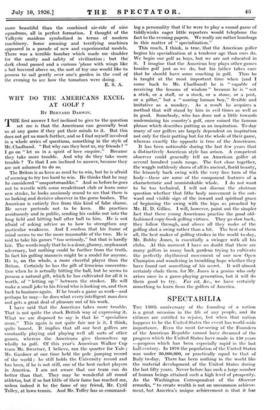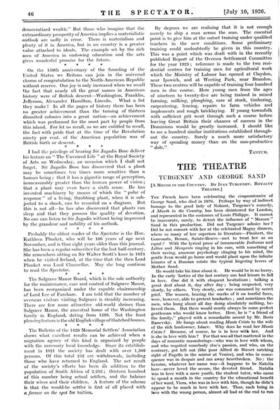SPECTABILIA.
THE 150th anniversary of the founding of a nation is a great occasion in the life of any people, and its citizens are entitled to rejoice, but when that nation happens to be the United States the event has world-wide importance. Even the most far-seeing of the Founders of the American Republic cannot have dreamed of the progress which the United States have made in 150 years —progress which has been especially rapid in the last half-century. In 1870 the population of the United States was under 80,000,000, or• practically equal to that of Italy to-day. There has been nothing in the world like the material development of the United States during the last fifty years. Never before has such a large number of human beings attained such a high level of prosperity. As the Washington Correspondent of the Observer remarks, "to create wealth is not an uncommon achieve- ment, but America's unique achievement is that it has democratized wealth." But those who imagine that the extraordinary prosperity of America implies a materialistic outlook are sadly in error. There is materialism and plenty of it in America, but in no country is a greater value attached to ideals. The example set by the rich men of America in endowing education and the arts gives wonderful promise for the future.
On the 150th anniversary of the founding of the United States we Britons can join in the universal chorus of congratulation to the North-American Republic without reserve. Our joy is only increased when we recall the fact that nearly all the great names in American history were of British descent—Washington, Franklin, Jefferson, Alexander Hamilton, Lincoln. What a list they make ! In all the pages of history there has been no greater, achievement than the turning of thirteen disunited colonies into a great nation—an achievement which was performed for the most part by people from this island. For let us recall, as we are entitled to recall, the fact with pride that at the time of the Revolution ninety per cent, of the American population was of British birth or descent.
I had the privilege of hearing Sir Jagadis Bose deliver his lecture on "The Unvoiced Life" at the Royal Society of Arts on Wednesday' an occasion which I shall not forget. Sir Jagadis Bose has discovered that a plant may be sometimes ten times more sensitive than a human being ; that it has a gigantic range of perception, immeasurably greater than the human power of vision ; that a plant may even have a sixth sense. He has invented machinery by means of which the " pulse of response" of a living, throbbing plant, when it is sub- jected to a shock, can be recorded on a diagram. But this is not all—he has also discovered that plants can sleep and that they possess the quality of devotion. No one can listen to Sir Jagadis without being impressed by the grandeur and nobility of his outlook.
Probably the oldest reader of the Spectator is the HOD. Kathleen Plunket, who will be 106 years of age next November, and is thus eight years older than this journal. She has been a regular subscriber for the last half-century. She remembers sitting on Sir Walter Scott's knee in 1824 when he visited Ireland, at the time that the then Lord Plunket was Lord Chancellor: May -she long continue to read the Spectator.
The Sulgrave Manor Board, which is the sole authority for the maintenance, care and control of Sulgrave Manor, has been reorganized under the capable chairmanship of Lord Lee of Fareham. I am told that the number of overseas visitors visiting Sulgrave is steadily increasing. There are few more attractive old-world shrines than Sulgrave Manor, the ancestral home of the Washington family in England, dating from 1589.. Not the least pleasing feature is the old English village of thatched houses.
The Bulletin of the 1820 Memorial Settlers' Association shows what excellent results can be achieved when a migration agency of this kind is organized by people with the necessary local knowledge. Since its establish- ment in 1921 the society has dealt with over 1,500 persons. Of this total 242 are withdrawals, including those who have returned to England. The net 'result of the society's efforts his been a addition to the population of South Africa of 2,236; thirteen hundred of this number being actual settlers, and the balance their wives and their children. A feature of the scheme is that the would-be settler is first of all placed with a farmer on the spot for tuition. By degrees we are realizing that it is not enough merely to ship a man across the seas. The essential point is to give him at the outset training under qualified teachers in the new conditions. Some preliminary training could undoubtedly be given in this country. This was a point which was dealt with in the recently published Report of the Oversea Settlement Committee for the year 1925; reference is made to the two resi- dential centres for training men, for agricultural work which the Ministry of Labour has opened at Claydon, near Ipswich, and at Weeting . Park, near Brandon. These two centres will be capable of training four hundred men in due course. Here young men from the ages of nineteen to twenty-five are being trained in mixed farming, milking, ploughing, care of stock, timbering, carpentering, fencing, repairs to farm vehicles and implements and rough bricklaying. If young townsfolk with sufficient grit went through such a course before leaving Great Britain their chances of success in the Dominions would be greatly increased. I should like to see a hundred similar institutions established through- out the country. Surely a much more satisfactory way of spending money than on the non-productive "dole."
TANTUM.











































 Previous page
Previous page